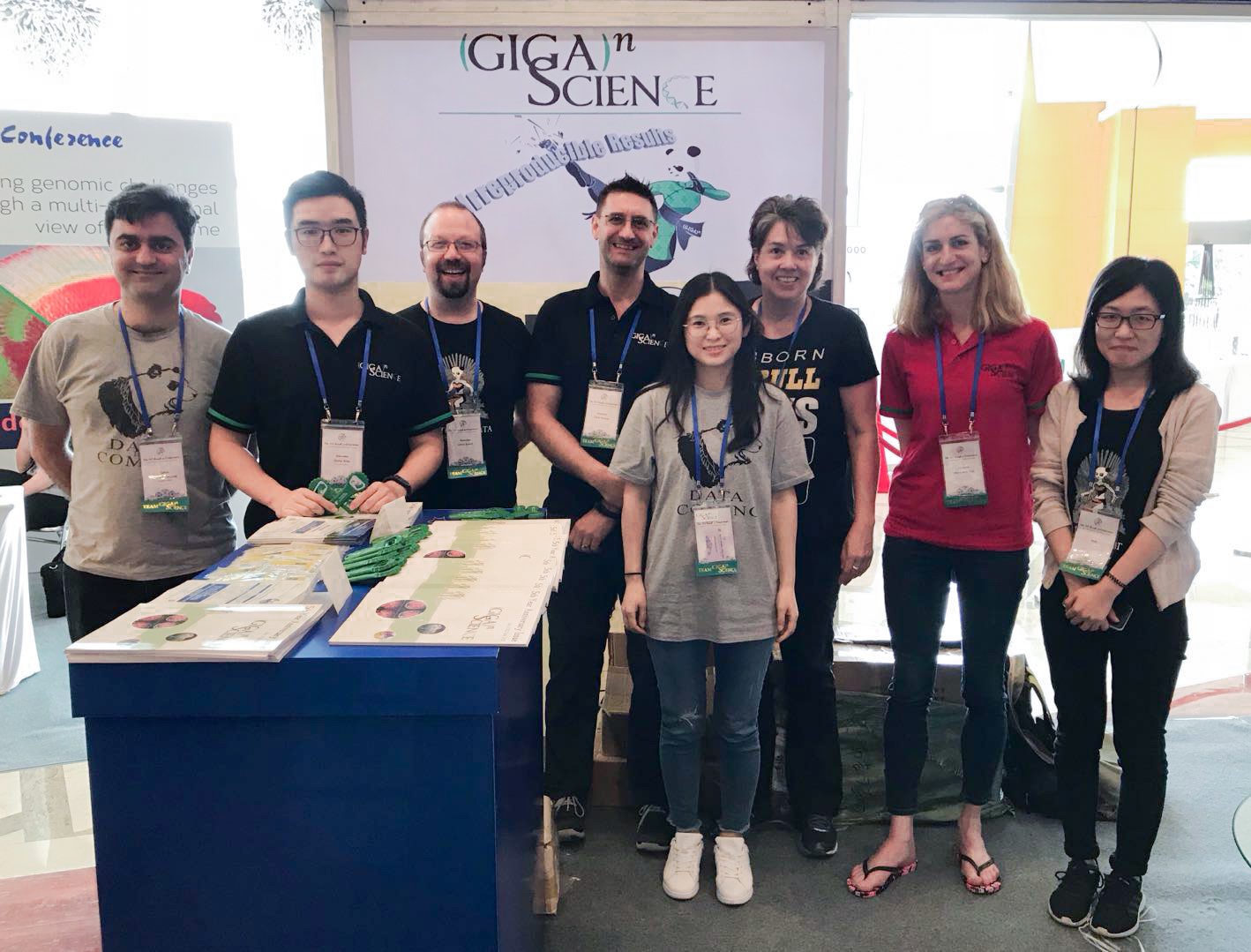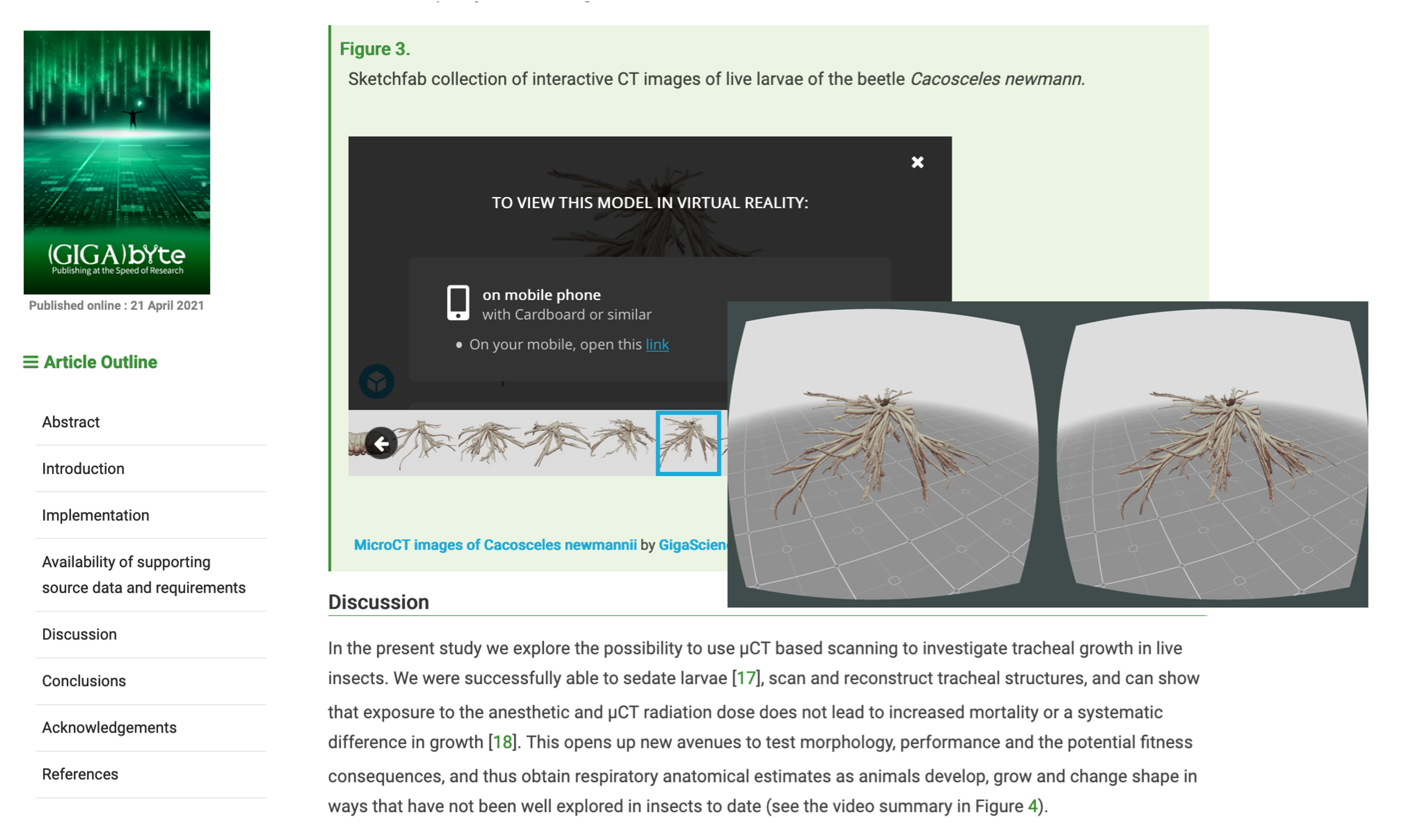This month marks the 10th anniversary of GigaScience, BGI's flagship scientific journal published by their open access publishing division GigaScience Press.
Born in an age of Big Data, GigaScience became the first journal to adopt a novel form of publication by providing all the supporting and associated data and other research (software, workflows, etc.) to the articles.
“The goal of everyone on our team was to change how scientific publishing was done.” explains Dr. Laurie Goodman, publishing director at GigaScience Press. “Aside from moving scientific journals online in the 1990s little had changed in over 350 years of scientific research publishing. That’s what we were determined to change”.
 Members of GigaScience Press at the Asia Evo Meeting in Shenzhen, 2018
Members of GigaScience Press at the Asia Evo Meeting in Shenzhen, 2018
GigaScience publishes articles that focus on ‘omics, imaging, and other high-throughput biology, which have data that is currently well-served by public repositories, and the ones with difficult-to-access data types, such as imaging, neuroscience, ecology, and network data, as well as systems biology and other new types of large-scale data.
Through open access to a large database created by GigaScience Press, GigaDB.org, readers can not only read about the findings but also obtain all the data and tools used by the researchers. This innovative approach allows them to verify the study with the raw data and the exact methods, adding credibility to the findings. Researchers can also build their own research based on the information provided. These resources are managed using the FAIR Principles for scientific data management and stewardship (of which GigaScience was an author on the original paper) that state that research data should be Findable, Accessible, Interoperable and Reusable.
GigaScience Press has also built GigaGalaxy.net, a Galaxy-based data analytics platform, to host computational methods and workflows to maximize the use of data in appropriate papers.
Major milestones also include promoting and integrating preprints and the protocols.io platform to present detailed methodology collaboratively and transparently and working with other platforms to contribute to a 21st century publishing infrastructure. Leading the way in the publishing industry for the other major publishers follow the practices of data publishing and Open Science.
Since 2016, GigaScience has been published in a partnership between GigaScience Press and Oxford University Press, and in 2018 the Association of American Publishers awarded GigaScience with its Professional and Scholarly Excellence Award (PROSE Awards) 1 for its innovation in multidisciplinary journal publishing. “We are trying to change published articles from stagnant things you can read (on paper or online) into executable articles,” said Laurie, explaining the reason for the award.
GigaScience Press also allows researchers to keep updating their studies with new findings and data, instead of a single submission practiced by traditional journals.
Launched in 2020, GigaByte is a journal that aims to promote the most rapid exchange of scientific information in a formal peer-reviewed publishing platform. Instead of looking for the “complete story”. GigaByte encourages researchers to share their ongoing studies, whose findings could be incredibly helpful to the science community immediately. Interactive features for data and software visualization are supported including interactive widgets, coding plugins, embedded video clips, visualization and interaction with 3D models, and blueprint downloading for 3D printing.
 VR Interactivity provided by GigaByte, one of its interactive features.
VR Interactivity provided by GigaByte, one of its interactive features.
These new efforts have just been recognized by GigaByte being shortlisted as a finalist for the 2022 Association of Learned and Professional Society Publishers (ALPSP) Awards for Innovation in Publishing. The winner is to be announced on September 16th at the ALPSP Conference in Manchester, England.
While GigaScience is shaping today’s science journal publishing, its adherence to globally recognized protocols for science research, copyright, and publishing are unwavering. GigaScience is an active member of the Committee on Publication Ethics (COPE) and as part of their Research Data Publishing Ethics Working Group has helped draft the COPE recommendations and checklists on the handling of ethical concerns relating to the publication of research data.
As of July 2022, GigaScience has published 1,021 papers by 7,198 authors from over 86 countries and 1,957 institutions. GigaDB.org has published 67TB of data, 2,195 datasets, and 347,185 files. And these numbers are climbing rapidly.
Leveraging the cost savings and unique features of their publishing platform, in May 2022 GigaScience Press published a series of data papers sponsored by World Health Organization publishing sharing extremely important public health datasets from vector-borne disease-causing organisms. The biodiversity data in these articles provide researchers with information to aid in the battle against this pressing public health issue that is responsible for more than 17% of infectious diseases.
“This is a collective effort carried out by everyone not just in GigaScience Press, but many researchers and supporters from the global science community, for which we are truly grateful,” said Dr. Scott Edmunds, Editor-in-Chief of GigaScience.
Rhodri Jackson, Publishing Director, Open Access, at Oxford University Press said: “OUP wishes GigaScience a happy 10th birthday! GigaScience is a truly innovative and exciting journal, and we greatly appreciate working together with GigaScience Press and the editors. Looking forward to the next ten years!”
After spending a decade on the front line of Open Science, the publication and ratification of the UNESCO Open Science Recommendations at the end of 2021 have been a fantastic boost to these practices. Signaling that Open Science has gone mainstream, it validates past efforts, and highlights what still needs to be done in the road ahead. GigaScience publishing an Editorial timed to go out on their birthday mapping their efforts onto the four key pillars of Open Science highlighted by UNESCO.
Using this decade of experience in publishing innovation and technology, GigaScience Press is now ready to launch new journals using this approach and publishing platform, and for offering a cost-effective and interactive solution for other journals that want to use this expertise to improve their own publication workflows in a similarly Open Science friendly manner.
Reference:
1. PROSE Awards recognized the best ones in professional and scholarly publishing by celebrating the authors, editors, and publishers whose landmark works have made significant advancements in their respective fields of study each year.
Read more: A Decade of GigaScience series: https://academic.oup.com/gigascience/pages/a-decade-of-gigascience



